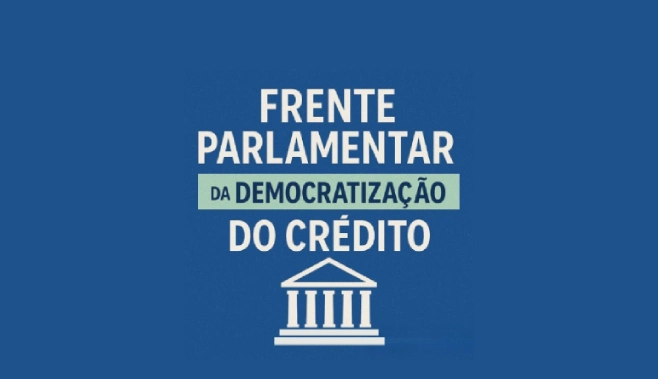Credit is an essential pillar for economic and social development in Brazil and around the world. Promoting debates that involve society and the legislature is one of the ways to guarantee the sustainability of the sector and access to credit for all individuals and companies. As I said recently, "credit is a fundamental pillar of economic and social development. For it to be sustainable, accessible and secure, a continuous dialog between the sector and legislators is essential."
The credit landscape in Brazil and around the world is undergoing a transformation, requiring innovative, transparent and inclusive solutions. In this context, the Joint Parliamentary Front for the Democratization of Credit and Financial Services (FPDC)This is a pioneering initiative, bringing together legislators, financial institutions and civil society to create a fairer, more accessible and legally secure credit environment.
A FPDC is a supra-party organization, composed of federal deputies and senators committed to expanding access to credit, especially to include groups with less visibility in obtaining credit, such as low-income people, pensioners, disabled people, women, heads of household, individual micro-entrepreneurs, small and micro-enterprises. O main objective is to ensure that credit is an instrument of financial inclusion, economic growth and social mobility.
A National Association of Credit Bureaus (ANBC) and the National Association of Professionals and Companies Promoting Credit and Correspondents in the Country (Aneps), which are part of the National Institute for the Democratization of Credit (INDC)are key players in this initiative, representing civil society in the Parliamentary Front. Together, these organizations will be instrumental in implementing debates, research and building a more efficient and inclusive credit environment.
The initiative aims to strengthen collaboration between the private sector and policymakers. As president of INDC, having just taken on the Institute's first term, I am excited about the potential to shape a legislative agenda that balances economic needs with financial stability.
Why is Legislative Engagement Fundamental to the Evolution of Credit?
Access to credit is more than an economic issue; is a social necessity. It allows individuals and companies to invest, grow and contribute to the country's development. However, some challenges remain:
- Regulatory Modernization - The rapid evolution of fintechs, Open Finance and data-driven credit requires a legal framework that encourages innovation and protects consumers.
- Financial Inclusion - Many Brazilians are still on the margins of the credit system. Expanding access to responsible credit can foster financial independence.
- Legal certainty and risk mitigation - Clear regulatory frameworks help to reduce financial risks, increase investor confidence and strengthen the credit market.
- Consumer Protection and Financial Education - Promoting financial education is essential for the responsible use of credit, reducing over-indebtedness and strengthening the economy.
A FPDC acts directly on these challenges, promoting policies that guarantee a fairer, more sustainable and transparent credit market.
The Role of the FPDC and the INDC
A Parliamentary Front for the Democratization of Credit (FPDC) and National Institute for the Democratization of Credit (INDC) play strategic roles in shaping Brazil's financial future. Their main actions include:
- Ensure that borrowers understand risks and opportunitiesavoiding excessive debt.
- Support data security policies and fair credit analysis to protect consumers and foster innovation.
- Defend policies that reduce credit bureaucracy and improve transaction conditionsmaking credit more accessible.
- Ensuring that companies and consumers have access to a balanced, transparent and sustainable credit market.
- Strengthen financial institutions and credit bureaus to guarantee fairer credit practices.
The role of the INDC
As a strategic partner of the FPDC, the INDC acts as the national representative of organizations in the credit and financial services sector. He will be responsible for:
📌 Defend the democratization of credit and expand financial access. 📌 Work with government bodies to develop credit-oriented public policies. 📌 Support legislative initiatives that protect borrowers and creditors. Organize studies, seminars and awareness campaigns. 📌 Encourage financial education and the responsible use of credit. Monitor and contribute to public policies that impact the credit sector. Strengthen the sector's image with the government and society.
With national operations and strong strategic coordination, the INDC will ensure that credit policies are aligned with economic growth, innovation and financial security.
A Future Based on Collaboration and Innovation
In ANBC, we believe that a well-structured credit system is an essential foundation for the country's economic and social progress. Through a partnership with INDCwe are committed to developing a a more inclusive, innovative and sustainable credit environment.
The FPDC represents a unique opportunity for dialog between financial institutions, credit bureaus, legislators and borrowers. This synergy is key to driving sustainable, high-impact reforms.
With the INDC alongside the FPDC, our commitment is to defend the democratization of credit, expanding financial access in an inclusive and efficient way. The future of credit in Brazil will be based on collaboration and innovation, and I encourage all stakeholders to join us on this transformative path.
Thanks for reading! Access other content at ANBC website.



